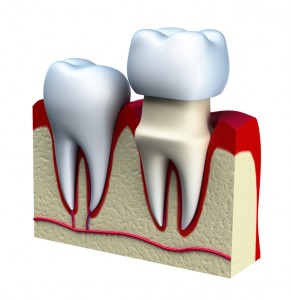 Single-implant crowns are one of the most common prosthodontic procedures in the United States. Every year, highly-skilled dentists place over two million crowns into patients’ mouths. Given this high volume, and the long history of crown usage in the U.S., most of these procedures proceed flawlessly. In fact, most people cannot tell the difference between their crowns and their natural teeth.
Single-implant crowns are one of the most common prosthodontic procedures in the United States. Every year, highly-skilled dentists place over two million crowns into patients’ mouths. Given this high volume, and the long history of crown usage in the U.S., most of these procedures proceed flawlessly. In fact, most people cannot tell the difference between their crowns and their natural teeth.
But no process is perfect, and these procedures do have some sporadic dental crowns problems. For the most part, these side-effects are incredibly mild and extremely rare. Dr. Stone thoroughly reviews the risks and rewards with each patient, so you always make an informed decision.
Temperature Sensitivity and Crowns
Between the crown and gum line, there is a very narrow area where sensitive tissue may be exposed. Typically, the exposure zone is so small that it’s invisible until discomfort occurs. The first bite or sip triggers this discomfort, and it immediately goes away thereafter. Usually, it does not come back again.
For that reason, many people do not consult Dr. Stone about this issues with their crowns or bridges. Sometimes, the episode was indeed a one-off affair. But other times, this discomfort could be a sign of a more serious issue. It’s always better to be safe than sorry, so reach out to us straightaway if such discomfort occurs.
Dental Crown Problems and an Uneven Bite

Because the procedure is so much less invasive, crowns are almost always preferable to extractions and implants.
Dr. Stone works hard to craft correctly-shaped crowns. But not all dentists are this diligent. Furthermore, a person’s bite pattern often changes over time. Finally, the patient’s mouth is numb while Dr. Stone affixes the crown. So, bite issues may not appear for some time thereafter. In these situations, the new crown may cause an uneven bite.
It is usually possible to adjust the crown in the patient’s mouth. In rare cases, especially if Dr. Stone did not fit the crown himself, it may be necessary to re-do the procedure.
Expanding Tooth Crack
Because the procedure is so much less invasive, crowns are almost always preferable to extractions and implants. But no one can predict how the tooth will react to the crown. Sometimes, the crack deepens at an accelerated rate. If that happens, the crown may be unable to contain the crack, and that causes dental crowns problems.
If a crack worsens or a crown loosens, reach out to us right away. We may be able to correct the issue with little additional work. Once the damage is extensive, more aggressive means are usually necessary.
Although there may be a few adverse issues here and there, crowns are usually the best way to address cracked or damaged teeth. To see what a difference this procedure can make for your appearance, not to mention your oral health, contact Dr. John Stone at Best Dental Associates. We are one of the leading prosthodontic providers in Ft. Lauderdale.
https://www.cdc.gov/nchs/products/databriefs/db197.htm


